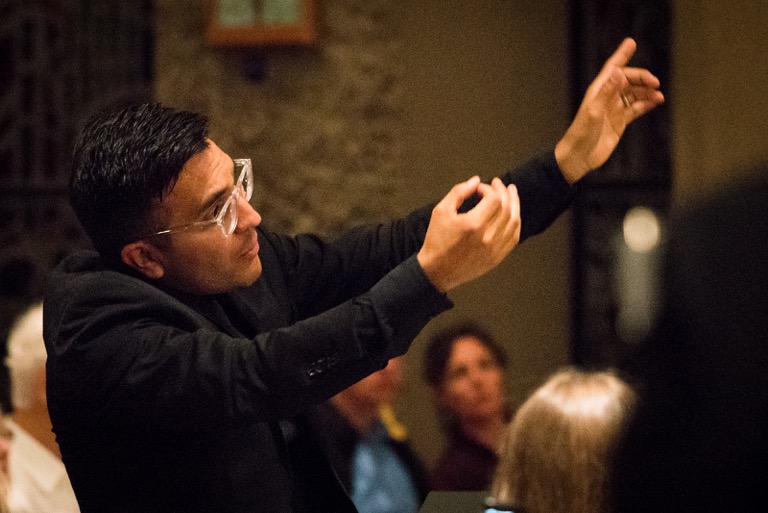Willan West Festival Closes on A High Note at All Saints’ Episcopal Church
With many other musical organizations across the continent, the San Diego Symphony’s programming throughout 2018 has observed the centennial of Leonard Bernstein’s birth. But choral director Ruben Valenzuela has chosen 2018 to bring attention to the music of another composer, the Anglo-Canadian Healey Willan, who died 50 years ago, with his Willan West 2018 festival.

Ruben Valenzuela [photo (c.) Gary Payne]
Although I have attended only a few of the Willan West offerings, I can attest that each one I heard offered highly disciplined, ardent choral singing of Willan’s motets and Mass settings, as well as faithfully rendered Gregorian chant versions of the Proper texts according to the Book of Common Prayer, a liturgical tradition cultivated by Willan and other Anglican musicians eager to restore worship to its ancient moorings in the history of the Christian Church.
Valenzuela, trained as a scrupulous musicologist, wisely chose to present most of Willan’s music in its intended context, the Anglo-Catholic liturgy, and All Saints’—an Episcopal congregation that upholds this high church worship tradition—has proven a welcome context for exploring Willan’s musical contributions.
At Saturday’s liturgy, Willan’s motets stood out for their elegance of contrapuntal design and even the occasional discrete tone painting. The 1931 motet at the Offertory, “O King, to whom all things do live,” unfolded with the leisurely lines of a classic Palestrina motet, sweetened with bold harmonic progressions that heightened its text, e.g., a touch of sonic brilliance at the words “the glory of light.” The Communion motet “Ave verum corpus” from 1943 displayed a rare use of Latin in this English language rite. According to Valenzuela’s program notes, in this motet Willan pays conscious homage to the great English Renaissance composer William Byrd’s setting of the same text. Valenzuela’s 13 choristers gave this motet a glowing yet serene interpretation, neatly balancing the choir’s sections with just the slightest emphasis to the soprano line.
Willan’s setting of the Mass Ordinary, Missa SS Philippi et Jacobi, displayed the composer’s typical approach to these texts: a gentle modal counterpoint that stressed the clarity of the text rather than the complexity of the composer’s invention. The “Sanctus” alone stood out with more agitated declamation, here heightened by the vigorous ringing of the bells at the altar, and the “Hosannah” echoed similar liturgical jubilation. In the Nicene Creed, which the congregation and choir sing together in simple plainsong, another Willan liturgical trait was observed: the single phrase “And was incarnate by the Holy Ghost of the Virgin Mary” was intoned in Willan’s rich harmonies by the choir alone.
At the postlude, Valenzuela played Willan’s Fugue in E Minor for organ, a masterful, extended display of the composer’s highly chromatic but always engaging contrapuntal genius. It reminded me of Johannes Brahms’ organ Fugue in A-flat Minor, another great opus today’s generation of recitalists has curiously overlooked.
It is tempting to compare Willan less favorably to Olivier Messiaen, another organist-composer of the last century unusually devoted to the interpreting the Christian story in musical language. More visionary in his musical language, Messiaen addressed the world outside the Church with vast tapestries of orchestral, piano and organ music. Willan addressed the faithful within the walls of the Church with his less a challenging but equally sophisticated idiom, one that spoke directly to the listeners without need of elaborate exegesis.
A labor of love and of superior musical standards, Willan West proved an estimable addition to San Diego’s 2018 musical landscape.
This presentation of Willan West 2018 took place at All Saints’ Episcopal Church, San Diego, CA, on Saturday, November 17, 2018.

I wonder if Willan drew his texts from the King James version of the Book of Common Prayer and whether All Saints’ uses it currently. I was very disappointed when St. Paul’s, where I sang in the choir, started using the newer version around 1972.
Willan died in 1968, so he did not live to see the Book of Common Prayer revised in contemporary English. The rite that was observed in these All Saints’ liturgies followed the 1928 Book of Common Prayer, which retained the Elizabethan language you encounter in the King James translation of Scripture. After decades of referring to the third person of the Trinity as the Holy Spirit, it was jarring to hear all those references to the Holy Ghost in these liturgies.